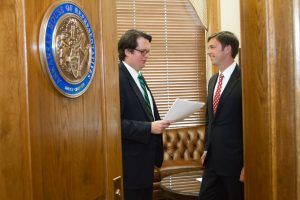Former GOP Speaker of the House Davy Carter offers session advice
by January 8, 2017 1:27 pm 510 views

When Russell Davis “Davy” Carter III arrived at the capitol following his election to a state house seat in 2008, he didn’t have much company. The GOP only controlled about 20 or so seats at that time. The Republican from Cabot wanted to make a difference, but his party didn’t have the votes because the Democrats held a supermajority in both chambers.
Little did he know that in four years he would make history, becoming the first Republican house speaker in Arkansas since Reconstruction.
“We were treated fairly (by the Democrats), but we didn’t have the votes to do a lot,” Carter told Talk Business & Politics. “During my time there … things changed rapidly.”
The Arkansas Legislature is set to convene on Monday, with Republicans dominating both chambers. The GOP virtually has a supermajority lock in both houses. Republican Asa Hutchinson is the governor. Carter isn’t sure how his political brethren will govern with their new and unprecedented control of state government.
But, he warns that political tides in Arkansas can change quickly – proved by his unlikely ascension to the speaker’s post. Arkansans are fiercely independent and political headwinds, like the weather in the Natural State, can morph at a moment’s notice.
“Things can change fast,” Carter said. “You can’t assume you’ll always have a majority. Arkansas is a small state … generally people are frustrated with politicians.”
Carter’s trek to the state capitol began in law school. The banker went to law school at night, and it was there he developed a yearning for public service, he said. He ran for a state house seat and won.
The first two years were relatively uneventful. The Democrats controlled both chambers and Democrat Mike Beebe was the governor. The political center in the state began to shift in 2010. Some across the country were unhappy with President Barack Obama’s policies, and a backlash against Democrats was felt during the November elections that year.
By 2012 the reliably blue Arkansas, at least at the state level, instantly turned purple, and showed signs it was about to become a solidly red state. Republicans sought control of the state house and won it. For the first time in 150 years the GOP took the house, and now a Republican speaker had to be selected.
Carter emerged from the fray to become the party’s first speaker since before the telephone was invented. In short order, he had to formulate a legislative agenda, and create a power structure for his party.
“It was a really humbling moment in my life,” Carter said.
The most pressing issue during that legislative session was the private option, the Medicaid expansion portion of the federal Affordable Care Act, commonly referred to as Obamacare. Both sides fought vigorously for and against the implementation of the program. Carter, Beebe and a coalition of Republicans and Democrats were able to convince enough legislators to support the private option, and now more than 200,000 people are receiving healthcare because of it.

Carter said he’s not sure what will happen if President-elect Donald Trump and the Republican-controlled Congress end the program.
Party is not always the defining characteristic of a lawmaker, Carter said. A lot of “insider fights” at the capitol are not along party lines. Many rifts occur between those who represent rural districts and those who represent urban ones, he said.
Carter, an Arkansas State University alumnus, returned to Northeast Arkansas after his tenure in the state assembly ended in 2014. He is the regional president for Centennial Bank. Carter, who has been touted for his ability to reach across party lines, said he wouldn’t completely rule out a return to politics, but it won’t be anytime soon.
“I really like my job … they are very good to me,” Carter said. “I’m 100% committed to Home Bancshares and raising my family.”
Arkansans voters’ values can be boiled down to a few simple truths, Carter said.
“Voters don’t want politicians getting into their lives,” Carter said. “They want to be left alone. They want their politicians to protect them, be responsible stewards with our money, and implement policies that help make our communities better,” he said.
